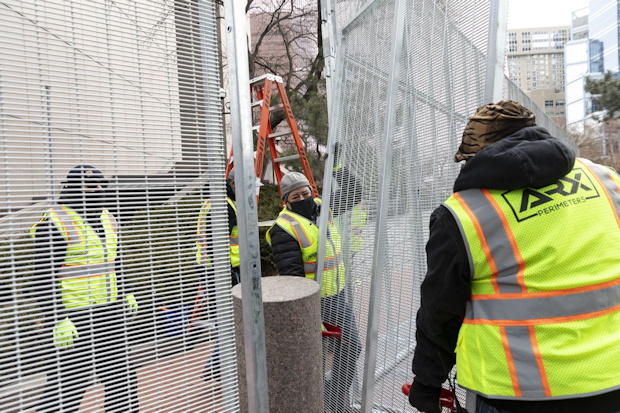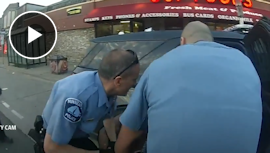'Riot Ready' Minneapolis - Over 3,100 Guard & Police
George Floyd Trial Spurs Minneapolis to Prepare for Unrest

Activist groups like Black Lives Matter have said
they plan to protest peacefully during the trial but can’t rule out the
possibility of civil unrest breaking out in the event of an acquittal. Minnesota
Public Safety Director John Harrington said in a briefing Monday that he is
coordinating with federal officials to monitor the possibility of extremist
groups trying to disrupt the trial but that there is no known imminent threat.
Barricades and barbed wire are rising in the area around the Hennepin County
Courthouse, where jury selection in the trial of former officer Derek Chauvin is
set to begin Monday.
Minneapolis Mayor Jacob Frey said the city has been working for months with
state and Minnesota National Guard officials on a plan to deploy a peak total
of 2,000 guard members and 1,100 police officers, including many from other
jurisdictions, when the jury starts deliberating in mid-to-late April.
 City
leaders were forced to call for help from the National Guard under duress during
last summer’s mass protests, which devolved into nights of rioting and looting
in commercial corridors across the city and the
surrender and destruction of a Minneapolis police station. This time,
officials say, they have had months to prepare and are vowing to maintain order
while allowing peaceful protests as the city faces what leaders are calling a
historic challenge.
City
leaders were forced to call for help from the National Guard under duress during
last summer’s mass protests, which devolved into nights of rioting and looting
in commercial corridors across the city and the
surrender and destruction of a Minneapolis police station. This time,
officials say, they have had months to prepare and are vowing to maintain order
while allowing peaceful protests as the city faces what leaders are calling a
historic challenge.
“This will be the culmination of a yearlong barrage of trauma to our city,
especially our Black and brown residents,” Mr. Frey said in an interview.
“Safety has to be our top priority.”
The city’s plans include community outreach and improved communication,
but some City Council members say the reliance on such a heavy police and
National Guard presence could add to tensions. “I don’t think that we can police
our way out of police violence,” council President Lisa Bender said in a public
hearing Monday.
In
widely circulated video footage, Mr. Floyd can be seen facedown on the
ground and losing consciousness as Mr. Chauvin placed a knee on his neck for
around eight minutes, as three other former officers assisted.
&uuid=(email)) As
workers boarded up windows and erected security barriers around government
buildings in downtown Minneapolis last week, a coalition of 17 activist
groups vowed a large-scale protest on Monday and a sustained presence throughout
the trial.
As
workers boarded up windows and erected security barriers around government
buildings in downtown Minneapolis last week, a coalition of 17 activist
groups vowed a large-scale protest on Monday and a sustained presence throughout
the trial.
“Their justice, their safety is putting up barricades and hindering our First
Amendment right for public assembly and protest,” said Angela Rose Myers,
president of the Minneapolis branch of the National Association for the
Advancement of Colored People. “We are not here to hinder justice, we are here
to deliver justice.”
Trahern Crews, founder and lead organizer of Black Lives Matter Minnesota, said
he hopes for a peaceful outcome but didn’t rule out the possibility of unrest
returning in Minneapolis and possibly elsewhere if Mr. Chauvin is acquitted.
“The whole country is watching right now,” Mr. Crews said in an interview. “And
I believe the majority of the country wants to see justice for George Floyd.”
Mr. Floyd’s killing sparked an outpouring of protests around the world and civil
unrest in major U.S. cities. Some 1,500 businesses in Minneapolis were affected,
sustaining around $1 billion in damage, said Jonathan Weinhagen, president and
chief executive of the Minneapolis Regional Chamber of Commerce.
The city has encouraged small-business owners who are concerned about looting to
consider boarding up windows, adding other security measures and storing
important documents off-site or in the cloud.
Officials said the extensive planning includes highly visible patrols of
commercial corridors by police backed up by National Guard troops.
Multiple mobile field teams will be dispatched to trouble spots around the
city. Any deployment of gas or other nonlethal methods of crowd dispersal
must be approved directly by the chief under a court order, Police Chief Medaria
Arradondo said.
wsj.com

&uuid=(email))


&uuid=(email))
&uuid=(email))
